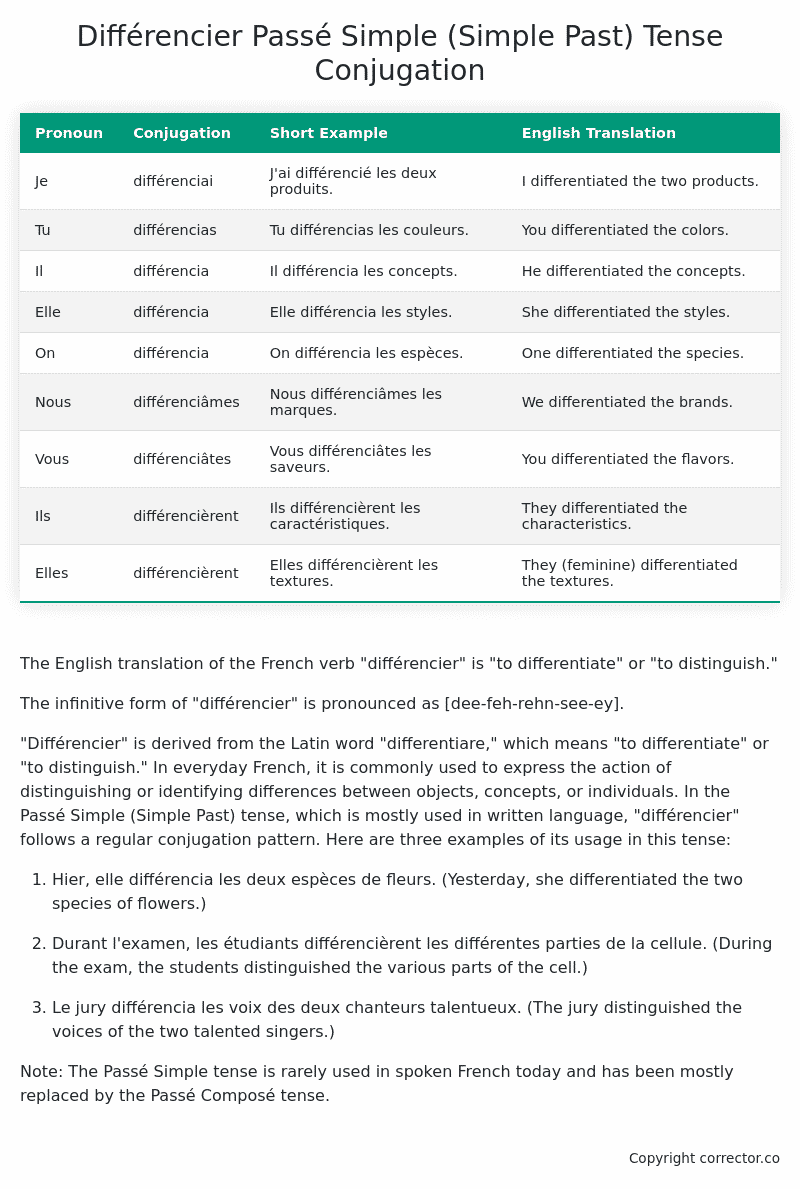Passé Simple (Simple Past) Tense Conjugation of the French Verb différencier
Introduction to the verb différencier
The English translation of the French verb “différencier” is “to differentiate” or “to distinguish.”
The infinitive form of “différencier” is pronounced as [dee-feh-rehn-see-ey].
“Différencier” is derived from the Latin word “differentiare,” which means “to differentiate” or “to distinguish.” In everyday French, it is commonly used to express the action of distinguishing or identifying differences between objects, concepts, or individuals. In the Passé Simple (Simple Past) tense, which is mostly used in written language, “différencier” follows a regular conjugation pattern. Here are three examples of its usage in this tense:
-
Hier, elle différencia les deux espèces de fleurs.
(Yesterday, she differentiated the two species of flowers.) -
Durant l’examen, les étudiants différencièrent les différentes parties de la cellule.
(During the exam, the students distinguished the various parts of the cell.) -
Le jury différencia les voix des deux chanteurs talentueux.
(The jury distinguished the voices of the two talented singers.)
Note: The Passé Simple tense is rarely used in spoken French today and has been mostly replaced by the Passé Composé tense.
Table of the Passé Simple (Simple Past) Tense Conjugation of différencier
| Pronoun | Conjugation | Short Example | English Translation |
|---|---|---|---|
| Je | différenciai | J’ai différencié les deux produits. | I differentiated the two products. |
| Tu | différencias | Tu différencias les couleurs. | You differentiated the colors. |
| Il | différencia | Il différencia les concepts. | He differentiated the concepts. |
| Elle | différencia | Elle différencia les styles. | She differentiated the styles. |
| On | différencia | On différencia les espèces. | One differentiated the species. |
| Nous | différenciâmes | Nous différenciâmes les marques. | We differentiated the brands. |
| Vous | différenciâtes | Vous différenciâtes les saveurs. | You differentiated the flavors. |
| Ils | différencièrent | Ils différencièrent les caractéristiques. | They differentiated the characteristics. |
| Elles | différencièrent | Elles différencièrent les textures. | They (feminine) differentiated the textures. |
Other Conjugations for Différencier.
Le Present (Present Tense) Conjugation of the French Verb différencier
Imparfait (Imperfect) Tense Conjugation of the French Verb différencier
Passé Simple (Simple Past) Tense Conjugation of the French Verb différencier (You’re reading it right now!)
Passé Composé (Present Perfect) Tense Conjugation of the French Verb différencier
Futur Simple (Simple Future) Tense Conjugation of the French Verb différencier
Futur Proche (Near Future) Tense Conjugation of the French Verb différencier
Plus-que-parfait (Pluperfect) Tense Conjugation of the French Verb différencier
Passé Antérieur (Past Anterior) Tense Conjugation of the French Verb différencier
Futur Antérieur (Future Anterior) Tense Conjugation of the French Verb différencier
Subjonctif Présent (Subjunctive Present) Tense Conjugation of the French Verb différencier
Subjonctif Passé (Subjunctive Past) Tense Conjugation of the French Verb différencier
Subjonctif Imparfait (Subjunctive Imperfect) Tense Conjugation of the French Verb différencier
Conditionnel Présent (Conditional Present) Tense Conjugation of the French Verb différencier
Conditionnel Passé (Conditional Past) Tense Conjugation of the French Verb différencier
Conditionnel Passé II (Conditional Past II) Tense Conjugation of the French Verb différencier
L’impératif Présent (Imperative Present) Tense Conjugation of the French Verb différencier
L’impératif Passé (Imperative Past) Tense Conjugation of the French Verb différencier
L’infinitif Présent (Infinitive Present) Tense Conjugation of the French Verb différencier
L’infinitif Passé (Infinitive Past) Tense Conjugation of the French Verb différencier
Le Participe Présent (Present Participle) Tense Conjugation of the French Verb différencier
Le Participe Passé (Past Participle) Tense Conjugation of the French Verb différencier
Struggling with French verbs or the language in general? Why not use our free French Grammar Checker – no registration required!
Get a FREE Download Study Sheet of this Conjugation 🔥
Simply right click the image below, click “save image” and get your free reference for the différencier Passé Simple tense conjugation!

Différencier – About the French Passé Simple (Simple Past) Tense
Formation
Usage
Narration
Historical Context
Interactions with other tenses
Passé Composé
Imparfait
Conditional and Subjunctive
Summary
I hope you enjoyed this article on the verb différencier. Still in a learning mood? Check out another TOTALLY random French verb conjugation!


